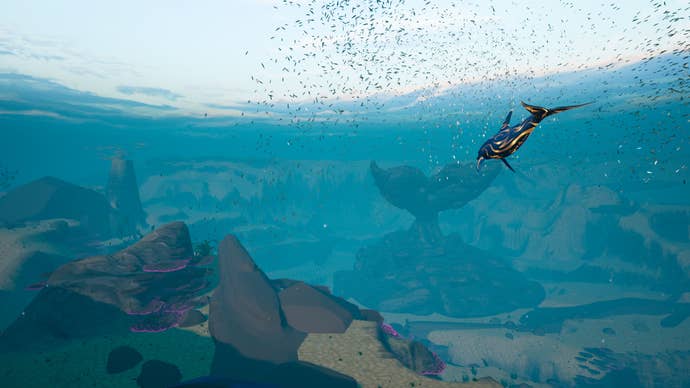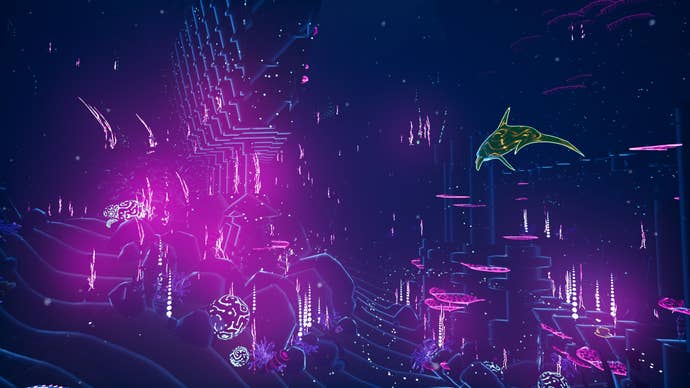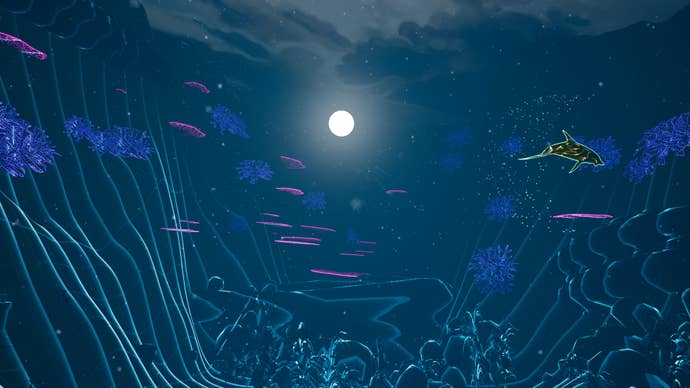With Jupiter and Mars, Two Former Game Journalists Hope to Save the Planet
Walk 100 miles in another dolphin's shoes. Or maybe swim. In their fins.
This article first appeared on USgamer, a partner publication of VG247. Some content, such as this article, has been migrated to VG247 for posterity after USgamer's closure - but it has not been edited or further vetted by the VG247 team.
Full Disclosure: Jeremy Parish worked with James Mielke and Sam Kennedy, the creators of this game, back at 1UP.
Of all the experiences I've had throughout my time in the gaming press, few have felt quite so surreal as interviewing the creators of Jupiter and Mars. Back in my time at 1UP.com, I formerly worked for both of the men behind TigerTron: James Mielke and Sam Kennedy. In fact, the two are responsible for giving me the biggest breaks in my professional career. So, standing on a crowded event space floor demoing their first game project, with my former bosses looking over my shoulder to take notes on my performance, was weirdly nerve-wracking in a way that working in the games press rarely has been for me.
Jupiter and Mars brings out a side of Mielke and Kennedy I never really saw in action during the time we worked together: namely, a desire to build awareness of environmental issues. I don't know if a video game can save the world, but that's their goal here. Many games ask players to "save the world," but only in a fictional context. You know, stop the zombie apocalypse, defeat the mad scientist, stop a tyrannical nihilist. TigerTron, however, wants to turn those in-game aspirations into real-world substance. Jupiter and Mars asks players to don a VR headset on a quest to save the planet—one the duo hopes will translate into real-world activism.

"The genesis of the game was, what if we could show what the world is like in 50 or 100 years, once the sea levels have risen due to climate change?" explains Kennedy. "It's a fascinating backdrop for a game, especially in VR, to put you in those situations where you're swimming through, say, a submerged London. It makes for a really unique game experience. That was a big inspiration for us in the early days."
"This is not some fictional planet," clarifies Mielke. "We didn't have to make anything up. I've been reading a book called The World Without Us, and watching a TV series called Life After Humans. They both explore how long it would take the earth to reclaim itself and realistically document what would happen. How would plants grow over and crush foundations of buildings? We set Jupiter and Mars in a non-specific time in the future where water levels have risen, and you see familiar environments underwater. We hope that'll trigger people to think, 'Wow, could this happen?'"
Jupiter and Mars tracks the journey of two dolphins—the game's title characters—with players using VR to "become" Jupiter, the female dolphin of the pair. The game's BitSummit demo starts at the beginning, and it showcases what will be the general feel of the game. A traditional control scheme is available, but by default the VR version allows you to propel yourself forward and activate certain actions with a standard controller while steering Jupiter through true 3D underwater space with head motions. While some of the sharper turns require a little more neck-twisting than I find comfortable, the VR motion works well and creates a convincing sensation of darting through the ocean.
Jupiter doesn't go it alone through the post-apocalyptic depths. She's accompanied by her friend Mars (names Mielke acknowledges he took from the cabaret standard "Fly Me to the Moon"). Mars races alongside Jupiter, always darting around the periphery of the player's vision and looking back at his companion. He plays an active role in the game too, as you can target certain points in the environment and command Mars to dash forward and smash into them. This may open up new paths to explore or simply reveal items to collect.
And collect you do. Despite its save-the-planet theme and immersive VR style, Jupiter and Mars definitely feels like, well, a video game. Jupiter can emit a sonar pulse to highlight interactive elements in the environment, push harmful objects aside with a stream of bubbles, and even complete collection quests. Your first in-game goal involves rescuing five baby turtles who have become trapped in ocean garbage left behind by the vanished human race. Once you've completed this task, the mother turtle will swim away to reveal an opening to the next area.

"We started off by designing a game we hope is fun, and then we add the science later," explains Mielke. "It's not mutually exclusive. We don't design the game and then try to force science in. We look for scientific things that would make good gameplay elements and then try to integrate those into the game. It's a pretty organic process."
Despite the turtle-saving quest and general theme of the game, Kennedy is quick to clarify that Jupiter and Mars isn't the kind of toothless save-the-planet learning project that dominated PCs during the early CD-ROM era of the ’90s. "We're definitely not edutainment or trying to be overly preachy," he says. "We're just trying to get people to think."
"That said, we're also partnered with some ocean awareness organizations, and they're giving us content that we're adding to the game as unlockables. Hopefully if people are impacted by the game's theme and story, they'll want to take action or learn more about they can do today. These days, especially with the current U.S. administration denying science, it's made us even more motivated to do something that will convince people to do something about the planet."
"We actually did a lot of research to learn how much the ocean would rise if the ice caps melted, and we looked at locations in the world that would suffer. Our depiction is accurate as to what would happen. But there's also some technology and science in the game that we learned about on the way. One of things you're trying to do in the game is to shut down technology humans have left behind. For example, we have something called A.H.D.—acoustic harassment devices—that exist today to keep sea life away from things. We have that as a gameplay element where you have to shut those down in order to progress in areas. So, we did a fair amount of research related to oceans and climate change."
It's difficult to play Jupiter and Mars without calling to mind Novotrade's Sega Genesis classic Ecco the Dolphin, which also featured a dolphin who journeyed through oceans endangered by predators. Mielke acknowledges the superficial similarity between the games, but he says it's precisely that: superficial.
"We get that comparison 99 percent of the time, which I understand. That's a dolphin game, this is a dolphin game. But that's like saying Super Mario and Halo are the same thing because they both feature human characters. We have nothing against Ecco, but I've never played more than a single level of an Ecco game in the past... I guess it got too hard, or whatever.""For us, the inspiration was more games like Ico, Super Metroid, Panzer Dragoon. Gated progression, power-ups, level design, the relationship between the two characters, the emotional value of the game. Those are the things we care about. It just happens to involve dolphins."

"The Metroid progression style is something we've loved all our gaming lives," adds Kennedy. "We have our own spin on it, but a big part of the game is to be able to backtrack and use new abilities to gain access to areas you couldn't reach before."
Jupiter and Mars lacks Ecco's ruthless difficulty level and feels less inspired by New Age philosophy. Instead, the game reveals an almost psychedelic vibe once you descend into the ocean depths where no sunlight reaches. The environments become drenched in midnight blue, with the glow of neon trim defining the edges of background elements. In these moments, the game betrays more of TigerTron's influences: Tron and Rez, two formative works for the developers.
The dark depths also call to mind another, more recent ocean-bound game: Abzu, which Kennedy calls "brilliant." Mielke takes pains to separate the two games, though.
"Abzu is cool, but I didn't know about it until we started working on Jupiter and Mars and someone said, 'Hey, you're aware that Abzu is out there, right?' We certainly took a look at it. But Abzu is like Journey—it's a very abstract experience that is about losing yourself in the environment. We want people to lose themselves in Jupiter and Mars, but we also set out to create a very game-y game. One with puzzles, with rules, with action mechanics."
"We also want to make something that was cool to explore, similar to games I've worked on in the past, like Child of Eden. We have a lot of highlight reel moments in the game that don't come across in a 10-minute demo. If the game wasn't about dolphins, it would be about something else, and we'd still have rules to get your head around. We don't want it to be so open-ended you don't know what to do, but we do want it to be something where someone who doesn't game a lot is watching, they can put on the headset and say, 'Oh, can I look around?' and enjoy themselves even if they don't anything."
Jupiter and Mars will also be shipping in a non-VR format, but the immersive experience works well. It's a strong start for TigerTron. Best of all, it might just prove that we games journalists aren't all bad.
